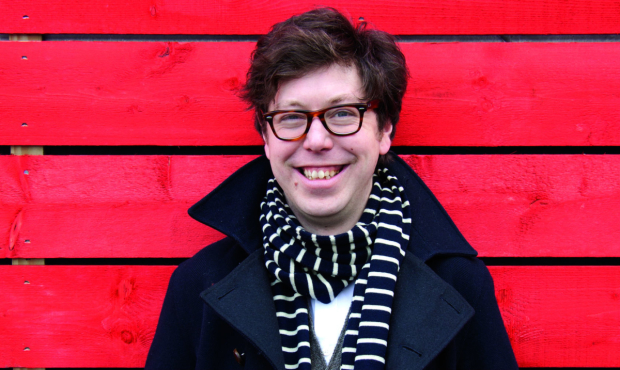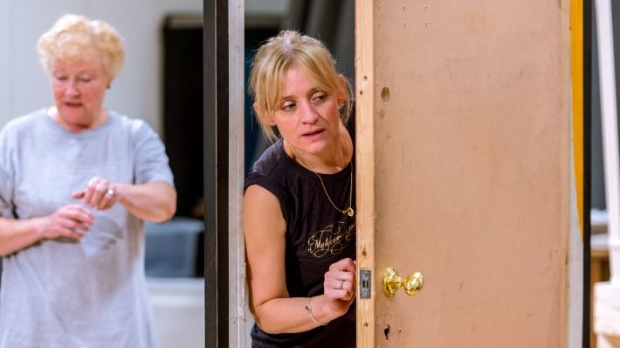Ben Power on Husbands and Sons and working with Rufus Norris

It's fair to say that the rise of Ben Power has been remarkable. Once the right-hand-man of Rupert Goold (during his pre-Almeida years), Power also worked as a literary associate on Complicite's superb – and Olivier Award-winning – A Disappearing Number. Since 2010 he's been an associate director at the National Theatre under Nick Hytner where, in five years, he has overseen a whole new strand of edgy work staged in the bright red Temporary Theatre. And now Rufus Norris has taken over, Power has been given the brand new role of deputy artistic director. All that, by the age of only 34.
Power by name, power by nature, perhaps. But with his floppy-hair, kooky glasses and constant broad smile, Power doesn't seem to be driven by theatrical world domination. He's approachable, funny, gracious and when talking about his work, the word 'collaboration' comes up a lot. Which, given that he works with a mind-numbing number of creatives at the National, is reassuring.
The shows he's currently involved with include Husbands and Sons, his adaptation of DH Lawrence's mining trilogy about to open in the Dorfman, his version of The Comedy of Errors for primary school pupils, Polly Findlay's As You Like It and pretty much all the work at the Temporary Theatre (which is still squatting outside the National). Power has a lot of fingers in a lot of pies.
Rather than directing, Power's forte is in words. Identifying himself as a dramaturg – someone who wrestles with, develops and researches texts – and a playwright, his main intention is clarity. "My priority is always about trying to communicate authorial intention to an audience," he explains. "Whether that's helping Lucy Prebble or Mike Bartlett on the way that they structure their plays or whether that's adapting a ten hour Ibsen into a three hour play [which he did with Emperor and Galilean in 2011], or putting three DH Lawrence plays together."

© Manuel Harlan
But is his new job much different to what he was doing under Hytner? "It is a different role because it's completely different here now," explains Power when I meet him in the National Theatre's tiny press office interview room. "Rufus is a totally different director of this theatre to Nick, he needs different things from the people he's working with."
Norris makes all the ultimate programming decisions, but Power is clearly a close confidante: "It's an evolving relationship," he says, "I'm trying to generate more options for the stages all the time. The idea is to get a full cupboard of projects."
His main project right now is the epic undertaking of Husbands and Sons. Starring Anne-Marie Duff with Louise Brealey and Susan Brown, his adaptation squeezes three Lawrence dramas about mining families – The Daughter-in-Law, A Collier's Friday Night and The Widowing of Mrs Holroyd – into one play. It has, he says, been hard work. "It's hugely complex, we started working on it in September last year, Marianne [Elliott the director] and I spent a lot of time together in workshops trying to create a structure. It's a lot about how one part of the stage relates to another."
I'm pleased to report that, despite being three shows in one, Husbands and Sons is not going to be that long. "It will be about three hours, which is shorter than I thought it was going to be," smiles Power. "But it needs a bit of scale." And apparently also a crack cast: Power and Elliott's way of working means they have been tinkering with the show throughout rehearsals. "It relies upon really phenomenal, adaptable actors and the kind of safe rehearsal process that Marianne builds. It means actors can keep changing and keep discovering."
Along with collaboration, discovery is another Power word. His work on the programme at the Temporary Theatre was all about discovery; bringing new voices, new companies, new audiences to the National; discovering talent and pushing it out to the theatre's varied audiences. "I think there's a generation of theatre makers, who could work on the Olivier and the Lyttleton stages who haven't worked on that scale yet. I think we need that." He says with a grin, "It's hugely exciting."
Husbands and Sons is at the National Theatre until 10 Feb. The Comedy of Errors runs until 6 November and As You Like It runs until 5 March.










